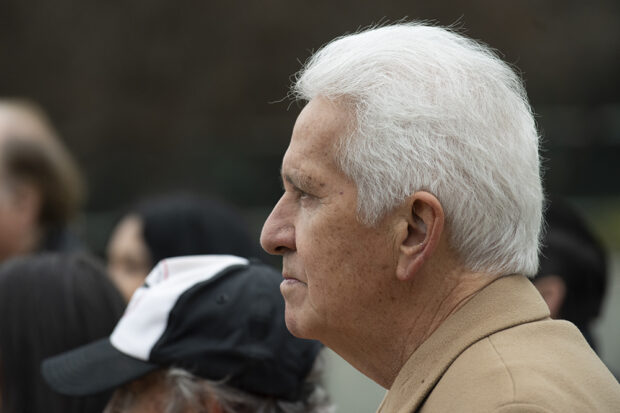
On April 8, Rep. Jim Costa (D‒Fresno) held a “Medicaid Matters” telephone town hall for a discussion with his constituents about Donald Trump and House Republicans’ budget proposal to cut Medicaid by $880 billion, or more, over 10 years. Costa acknowledged that there are several other important issues but wanted to confine the discussion to the reconciliation package vote scheduled for April 9.
Costa said that he opposes the Republicans moving forward to sustain the 2017 tax cuts for the richest people in the country by taking away healthcare from the poorest people in the country.
People might have some disagreement with Costa over various issues he has taken in the past. He has not always strongly defended the interests of people in his district.
At the town hall, Costa explained to the 8,000 people on the call why he was strongly opposed to the House Continuing Resolution that would cut federal Medicaid spending. He defended the need for America to maintain Medicaid as the country’s healthcare safety net for the poor, the elderly and disabled individuals.
Costa noted that politicians cannot say they care for rural people by voting to take away healthcare from their constituents. He explained how hospitals need Medicaid to stay open and how medical providers need Medicaid to provide services to their patients.
The fiscal impact of losing Medicaid will mean that hospitals will close, people will lose jobs and, most important, people will die from lack of healthcare, according to Costa. Medicaid means the difference between life and death for many people. It is “not fiscally responsible to allow so many people to die,” says Costa.
“To pass the 2017 Tax Cuts and Jobs Act with a simple majority in the Senate, Republicans had to use a process called reconciliation.” By using reconciliation, the tax cut could not add to the deficit for a certain time period. The federal deficit is the situation where annual expenses exceed income. The current national debt of $36 trillion is the amount the United States owes after years of running deficits.
For the 2017 tax cuts to meet the reconciliation requirement, most of the individual tax cuts had to expire at the end of 2025. During his 2024 campaign, Trump promised to extend his 2017 tax cuts. To do so, Congress must cut at least $2 trillion from the budget, which still does not fully pay for the Republicans’ $4.5 trillion in tax cuts over 10 years. DOGE, the acronym for the euphemistically titled Department of Government Efficiency, is trying to cut the budget by $2.5 trillion so that the tax cuts will not increase the deficit.
On Feb. 25, without any Democratic support, the Republican majority passed (217 to 215) a budget resolution, the House Continuing Resolution 14. That continuing resolution instructed the House Energy & Commerce Committee (E&C) to find ways to reduce the federal deficit by at least $880 billion over 10 years. The budget resolution did not mention Medicaid. However, it was understood that because the E&C Committee has jurisdiction over Medicaid, the E&C would identify Medicaid programs to meet the $880 billion budget cut target.
Medicaid is healthcare coverage designed to help lower-income individuals in the United States pay for basic healthcare needs such as hospital and doctor visits, medications, pregnancy care and blood tests. Cuts to Medicare were excluded because Medicare was believed to be off the table because it affects older people who are more likely to vote.
By eliminating Medicaid and Supplemental Nutrition Assistance Program benefits (or food stamps), lower-income Americans would suffer the most from these budget cuts. By eliminating all Medicaid expenditures, the Republicans would be able to pass their tax bill to extend Trump’s 2017 tax cuts for corporations and the wealthy.
Costa said that although the Republicans are essentially proposing to eliminate Medicaid, they are offering nothing to replace it. Medicaid pays about 70% of the healthcare coverage for the poor in most states, and the states pay about 30% of those healthcare costs.
Medicaid services vary among the states. The states have wide latitude in terms of what services are covered and how much they pay for those services. Without the federal government’s support of Medicaid, the states would have to decide whether to stop healthcare services for the poor, provide fewer services to fewer people and/or to cut other parts of their state budgets such as education, infrastructure, public safety and regulation.
Costa also pointed out how many people in the Central Valley benefit from Medicaid. Indeed, the districts of Central Valley Republican members of Congress have some of the largest numbers of Medicaid recipients in the country. The San Joaquin Valley has 1.8 million Medicaid recipients.
The district of David Valadao (R‒Hanford) is No. 1 in the country with more than 500,000 Medicaid recipients. At No. 4 is the district of Rep. Vince Fong (R‒Bakersfield) with 260,000 Medicaid recipients. And there are 246,000 Medicaid recipients in the district of Tom McClintock (R‒Elk Grove). All three voted for the continuing resolution in February for the E&C Committee to find budget cuts that would allow the 2017 tax cuts for corporations and the wealthy to be extended.
For the sake of the health and well-being of the people in the San Joaquin Valley, Costa hopes those Republicans will oppose the continuing resolution to enable the extension. Hospitals will close, people will not be able to receive healthcare and people will die.
